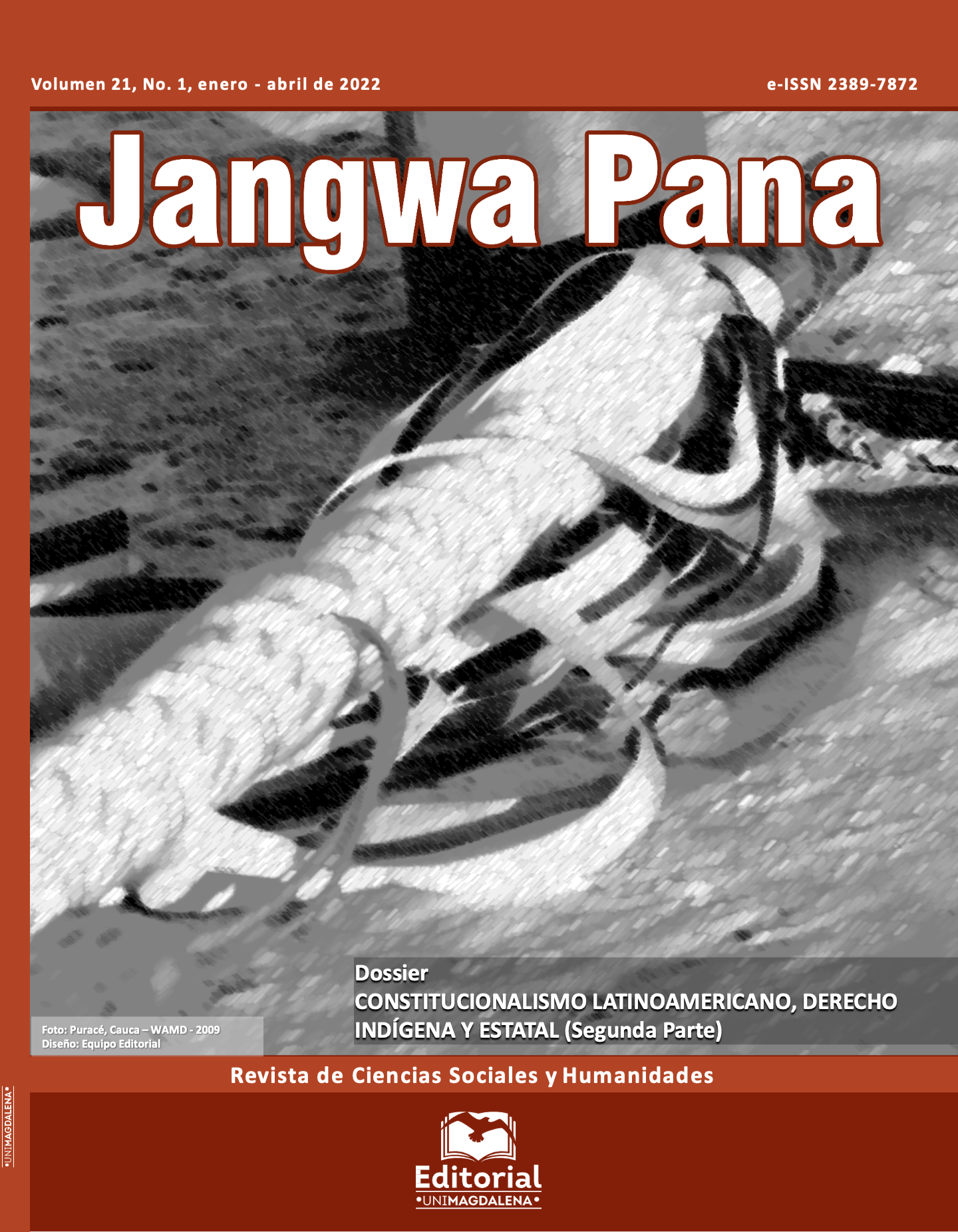Indigenizing reconciliation: questions of jurisdiction for Indigenous victimizers in post-conflict zones and an argument for traditional systems
Main Article Content
Abstract
Indigenous peoples’ around the world face multiple vulnerabilities that are exacerbated in armed conflict scenarios. Members of indigenous communities are hit by the scourge of conflict from two perspectives. On the one hand, they are victims of crimes and violations of their human rights, while on the other hand, community harmony is affected by Indigenous individuals who by decision or forced recruitment become victimizers, participating in the armed hostilities and often affecting their own community. This article aims to analyze the effectiveness of Indigenous peoples' legal systems to apply criminal accountability on indigenous individuals who commits crimes that fall under the jurisdiction of the International Criminal Court (such as crimes against humanity and war crimes) during domestic armed conflicts. The paper analyzes whether the objectives of effective international criminal accountability are fulfilled with the application of justice by customary legal systems that differ from national and international jurisdictions recognized from Western justice perspectives. To this end, the article analyzes the international legal framework that supports Indigenous peoples’ rights to engage in their traditional justice systems, also explores different notions of justices and criminal responsibility of indigenous communities around the world, and, studies a variety of indigenous jurisdictions in Latin America which recognize a legal pluralism, with a special emphasis on the Colombian case. Later, the article studies the objectives of the international criminal jurisdiction, and finally, it discusses the harmonization of indigenous legal systems in compliance with international parameters of criminal accountability. The article concludes that Indigenous Peoples’ traditional justice systems can be compatible with international standards of criminal responsibility, as long as the systems comply with human rights obligations and the international standards of the International Criminal Court (ICC).
Downloads
Article Details
References
Agencia de las Naciones Unidas para los Refugiados. (2019) Situación de los Pueblos Indígenas en Colombia. http://www.acnur.org/t3/fileadmin/Documentos/RefugiadosAmericas/Colombia/2012/Situacion_Colombia_-_Pueblos_indigenas_2012.pdf?view=1
Anaya, J. (2012). Informe del Relator Especial sobre los Derechos de los Pueblos Indígenas. A/HRC/21/47.
Anthony, T. (2013). Indigenous Peoples Crimes and Punishment. Routledge.
Bolaños, E. A. (2014, noviembre 7). Justicia indigena impone su ley. El Espectador. https://www.elespectador.com/noticias/nacional/justicia-indigena-impone-su-ley-articulo-526506
Centro de Memoria Histórica. (2013). ¡Basta ya! Colombia: Memorias de Guerra y Dignidad. Imprenta Nacional.
Constitución de la República de Ecuador (2008) Recuperado de: https://www.wipo.int/edocs/lexdocs/laws/es/ec/ec030es.pdf
Constitución Política de Bolivia (2009) Recuperado de: https://www.oas.org/dil/esp/Constitucion_Bolivia.pdf
Constitución Política de Colombia [Const.] (1991) Recuperado de: http://www.secretariasenado.gov.co/senado/basedoc/constitucion_politica_1991_pr008.ht
Constitución Política del Perú (1993) Recuperado de: http://www4.congreso.gob.pe/ntley/Imagenes/Constitu/Cons1993.pdf
Convenio 169 sobre Pueblos Indígenas y Tribales, 27 de junio, 1989. Organización Internacional del Trabajo.
Corte Constitucional, (10 de julio de 2003) Sentencia T -552 de 2003. [MP Rodrigo Escobar Gil]
Corte Constitucional, (15 de octubre de 1997) Sentencia T – 523 de 1997. [MP Carlos Gaviria].
Corte Constitucional, (18 de febrero de 2003) Sentencia C-127 de 2003. [MP Alfredo Beltrán].
Corte Constitucional, (7 de junio de 2001) Sentencia T-606 de 2001. [MP Marco Monroy Cabra]
Corte Constitucional, (8 de agosto de 1996) Sentencia T-349 de 1996. [MP Carlos Gaviria Díaz].
Corte Constitucional. Anuario de derecho constitucional latinoamericano, 2, 761-778. Recuperado de: http://www.corteidh.or.cr/tablas/r21731.pdf
Declaración de las Naciones Unidas sobre los Derechos de los Pueblos Indígenas, A/RES/61/295 (Asamblea General de las Naciones Unidas Septiembre 13, 2007).
Estatuto de Roma, 1 de julio, 2002. Corte Penal Internacional.
Gaykamangu, J., y Terence Kelly, D. (2012). Ngarra Law: Aboriginal Customary Law from Arnhem Land. Northern Territory Law Journal, 2(4), 236-248. http://legalonline.thomson.com.au/jour/resultDetailed.jsp?curRequestedHref=journals/NTLJ/volumes/2/parts/4&contentSourceHref=journals/NTLJ/volumes/2/parts/4/articles/236/fulltext&tocType=fullText&hitListPageContext=http://legalonline.thomson.com.au/jour/r
Haeserijin, E. (1975). Filosofía Popular de lo K'ekchi' de hoy. Guatemala Indígena, 10, pp. 44-54. https://biblat.unam.mx/es/revista/guatemala-indigena/articulo/filosofia-popular-de-los-kekchi-de-hoy
Instituto Internacional de Estocolmo para la Investigación de la Paz. (2020, abril 20). The Consequence of Internal Armed Conflict for Development. Stockholm International Peace Research Study.
https://www.sipri.org/commentary/blog/2015/consequences-internal-armed-conflict-development-part-2
Jurisdición Especial para la Paz – JEP. (2020, marzo 2) Acuerdo ASP No. 001 de 2020.
Klamberg, M. (2010). What are the Objectives of International Criminal Procedure? Reflections on the Fragmentation of a Legal Regime. Nordic Journal of International Law, 79, 279-302.
Ley 073 (2010) De deslinde jurisdiccional. Gaceta Oficial de Bolivia, 29 de diciembre de 2010.
Ley 1957 (2019) Estatutaria de la Administración de Justicia en la Justicia Especial para la Paz. Diario Oficial No. 50.976.
Ley 270 (1996). Estatutaria de la Administración de Justicia. Diario Oficial No. 42.745.
Pacto Internacional de Derechos Civiles y Políticos, 23 de marzo, 1976.
Programa de las Naciones Unidas para el Desarrollo. (2011). Informe de Desarrollo Humano. Bogotá.
Robinson, D. (2003). Serving the Interest of Justice: Amnesties, Truth Commissions and the International Criminal Court. European Journal of International Law, 14, 481-505.
Semper, F. (2006). Los derechos de los pueblos indígenas de Colombia en la jurisprudencia de la
Sieder, R. (2011). Contested Sovereignties: Indigenous Law, Violence and State Effects in Postwar Guatemala. 31, 161-184.
http://racheluk.domain.com/wp-content/uploads/2012/08/Sieder-Contested-Sovereignities.pdf
Sieder, R. (2012). The challenge of Indigenous legal systems: Beyond paradigms of recognition. The Brown Journal of World Affairs, 18, 103-114. https://www.jstor.org/stable/24590866
Stavenhaguen, R. (1990). Derecho consuetudinario indígena en América Latina. Instituto Indigenista Interamericano e Instituto de Derechos Humanos, pp. 27-28.
Stavenhaguen, R. (2006). Derecho consuetudinario indígena en América Latina. In V. C. Jurídica, Grandes Temas de la Antropología Jurídica (pp. 15-25). Oaxtepec: Red Latinoamericana de Antropología Jurídica.
Tauli-Corpuz, V. (2019). Informe del Relator Especial sobre los Derechos de los Pueblos Indígenas. A/HRC/42/37.
Viaene, L. (2013). La relevancia local de procesos de justicia tradicional. Voces de sobrevivientes indígenas sobre justicia y reconciliación en Guatemala posconflicto. Antípoda - Revista de Antropología y Arqueología, 16, pp. 85 - 122. https://doi.org/10.7440/antipoda16.2013.05
Woodroffe, D. (2006). Aboriginal Customary Law and the Sentencing Discretion by Courts in the Northern Territory. National Indigenous Legal Conference. Sidney.
Yrigoyen, R. (1999). Reconocimiento constitucional del derecho indígena y la jurisdicción especial en los países andinos (Colombia, Perú, Bolivia y Ecuador). Revista Pena y Estado, 4, 120 - 145.
Yrigoyen, R. (2006). El reconocimiento del pluralismo jurídico y el derecho indígena en las políticas indigenistas y el constitucionalismo andino. Pueblos Indígenas y Derechos Humanos, 4, 537-567.

